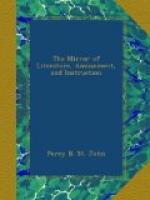Longevity.
The relative advantages of town and country, in point of salubrity, are shown by the following table of deaths:—
1. In great towns, from 1-19 or 1-20, to 1-23 or 1-24.
2. In moderate towns, from 1-25 to 1-28.
3. In small villages and the open country, from 1-35 or 1-40, to 1-50 or 1-60.
Thus, in London one person in 20 of the whole population dies annually; while in the healthiest villages and open country, the rate of annual mortality is not more than 1 in 55 or 60.
Atmosphere of Theatres.
Lavoisier, the French chemist, found, in a theatre, that, from the commencement to the end of the play, the oxygen, or vital air, was diminished in the proportion of from 27 to 21, or nearly one-fourth, and was in the same proportion less fit for respiration than before.
Butterflies.
In June, 1826, a column of butterflies, from 10 to 15 feet broad, was seen to pass over Neuchatel, in Switzerland. The passage lasted upwards of two hours, without any interruption, from the moment when the butterflies were first observed.—Brewster’s Journal.
Water Plant.
A shrub has been discovered in our new Indian countries, from whose stem, when divided, there issues a copious vegetable spring of limpid and wholesome water. The natives know this well, and hence we rarely meet with an entire plant. It is a powerful climber, and is quite new and nondescript.—Letter from India.
Malaria and Fevers.
It is notorious, that, in the last autumn, the remittent fevers in various parts of the country amounted to a species of pestilence, such as has scarcely been known in England from this cause since the days of Dr. Sydenham. Wherever ague had existed, or ever had been supposed possible, in those places was this fever found; so that in all the well-known tracts in Lincolnshire, Norfolk, Suffolk, Kent, Essex, Sussex, Hampshire, &c. there was scarcely a house without one or more inhabitants under fever, with a considerable mortality. In the parish of Marston, in Lincolnshire, it amounted to 25 in 300 inhabitants. The same fevers were extremely abundant in various parts of the outskirts of London, as also in the villages or towns which are connected with it, within a range of from six to ten miles. This was the case throughout the range of streets or houses from Buckingham Gate to Chelsea; in which long line, it is said, that almost




